Best Evidence for Improving Brain Health
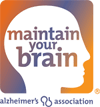 The Alzheimer’s Association working in conjunction with the National Institute for Health has a established a website to keep citizens up to date on what the latest scientific evidence has to say by brain health. The site Maintain Your Brain, recommends eating a brain-healthy diet and staying physically, mentally and social active. Techniques we have covered elsewhere in the Next Brain Blog.
The Alzheimer’s Association working in conjunction with the National Institute for Health has a established a website to keep citizens up to date on what the latest scientific evidence has to say by brain health. The site Maintain Your Brain, recommends eating a brain-healthy diet and staying physically, mentally and social active. Techniques we have covered elsewhere in the Next Brain Blog.
Of special interest is the 70-page National Public Roadmap for Maintaining Cognitive Health (this a 2.5 MB file) and the Interactive Tour of the Brain. The tour is quick and easy but informative. It provides basic knowledge of the brain and Alzheimer’s disease.
A few minutes on the site provides strong motivation for considering the long-term health of your brain and what needs to be done today. To quote the site:
“When people think about staying fit, they generally think from the neck down. But the health of your brain plays a critical role in almost everything you do: thinking, feeling, remembering, working, and playing – even sleeping.”
Interested to hear from readers on what specific things they are doing to maintain brain health.
Categories: Cognitive Decline, Diet, Lifestyle Tags:
Neurobics: Low-Effort Cognitive Stimulation!
 Neurobics is a unique approach to brain training developed from the latest findings in neurobiology. According to one popular approach, Keeping Your Brain Alive, the core idea is this:
Neurobics is a unique approach to brain training developed from the latest findings in neurobiology. According to one popular approach, Keeping Your Brain Alive, the core idea is this:
“Neurobic exercises use your five physical senses and your emotional sense in unexpected ways and encourage you to shake up your everyday routines. Neurobics don’t require paper and pen or isolating yourself with puzzles. Everyday life is the Neurobic Brain gym. They can be done anywhere, anytime in offbeat, fun and easy ways while you’re getting up, commuting, working, eating, shopping or relaxing. They are designed to help the brain manufacture its own nutrients that strengthen, preserve and grow brain cells.”
Some examples:
- Take a different route when commuting to work this morning
- Brush your teeth with the other hand
- Use just the sense of touch when unlocking a door (don’t look at the lock)
- Move your waste basket at work
- Sit someone different at the dinner table tonight
Tiny changes with a significant and positive neurochemical impact. Any exercise can be Neurobic as long as it involves your senses in a new context, demands attention and breaks routine. This means we can design our own! The Keep Your Brain Alive Program was developed by Larry Katz a well-known Duke University Neurobiologist and includes 83 very specific things to try.
Interested to hear from readers that do Neurobics. What exercises do you do and how have you built them into your daily routine?
Categories: Books, Cognitive Decline, Lifestyle, Manage Emotions, Mental Focus, Perception Tags: brain training, experiential learning
3-Hour Brain Boot Camp at UCLA
 The Center for Memory and Aging at UCLA offers a half-day intensive course that covers (and I quote):
The Center for Memory and Aging at UCLA offers a half-day intensive course that covers (and I quote):
- Measure baseline memory, stress and fitness levels to individualize healthy lifestyle programs.
- Learn basic techniques to respond to everyday memory challenges..
- Sample a healthy brain diet and learn recipes for a brain-protective nutritional plan.
- Master advanced memory techniques for names and faces.
- Practice relaxation exercises to improve mental focus.
- Map out a daily lifestyle plan for maintaining benefits for the long haul.
- Gauge progress and notice results in just one day.
The course is geared towards older adults with memory concerns. It was developed by Gary Small and other experts in memory, aging and the brain.
Interested to hear from readers that have completed this course or similar courses that take a scientific approach to age-related memory challenges.
Categories: Cognitive Decline, Memory and Learning, Older Adult, Training Tags:
Fish Oil Fails to Boost Cognition in Older Adults
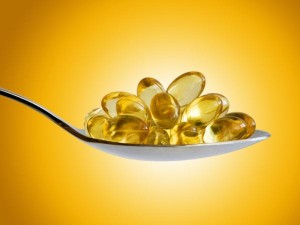 Another major scientific study on a technique for improving brain function and cognitive performance has delivered a negative result. The study looked at the cognitive impact of taking Omega 3 fatty acid or fish oil over a two year period on 70-80 year olds. The study found:
Another major scientific study on a technique for improving brain function and cognitive performance has delivered a negative result. The study looked at the cognitive impact of taking Omega 3 fatty acid or fish oil over a two year period on 70-80 year olds. The study found:
No cognitive improvements as compare to a placebo.
The author of the study cautions drawing strong conclusions as it may take more than two years to see an effect or it might be essential to start earlier in life. To quote:
“From the data we have collected in the OPAL study there is no evidence of an important benefit for memory or concentration of increased omega-3 fatty acid consumption over a two year period among older people with good cognitive health. However, it is important to keep in mind that poor cognitive function can take many years to develop and although this is the longest trial of its kind ever conducted, it may be that it was not long enough for any true beneficial effects to be detected among this healthy cohort of older people”.
OPAL stands for Older People And omega-3 Long-chain polyunsaturated fatty acids. The OPAL study seeks to discover simple dietary supplements that will help maintain cognitive and retinal function later in life. We will continue to track their work and report results on the Next Brain Blog.
Categories: Cognitive Decline, Diet, Memory and Learning, Older Adult Tags:
A Store Just for Your Brain
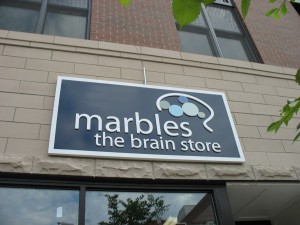 Marbles is a store just for your brain. They have four locations in Illinois and are looking to expand. Fortunately, their products are available online.
Marbles is a store just for your brain. They have four locations in Illinois and are looking to expand. Fortunately, their products are available online.
They offer an overview of brain fitness, a free self assessment and products to improve memory, critical thinking, coordination, word skills and visual perception. They provide books, brain software, toys and novelty items from many different vendors. Marbles takes the time to make gift bundles for the Wordsmith, Trickster, Creative Genius, Brainetics (whatever that is) and others. They offer some free Brain Coaching and sponsor a number of interesting events.
Marbles could well be a superstore for anyone looking to improve brain function and cognitive performance. They will be the subject of regular posts on the Next Brain Blog. I am interested to hear from readers that have visited one of the store locations.
Categories: Books, Cognitive Decline, Decision Making, Memory and Learning, Perception, Software, Training Tags: brain training, cognitive fitness
Which Fish are Best For Your Brain?
 A reader asked, is fish really good for brain function and if so which fish is best? Some fish contain Omega 3 fatty acids which have been shown to improve memory function, increase serotonin (elevate mood) and support longer-lasting cells and more efficient messaging.
A reader asked, is fish really good for brain function and if so which fish is best? Some fish contain Omega 3 fatty acids which have been shown to improve memory function, increase serotonin (elevate mood) and support longer-lasting cells and more efficient messaging.
Mindpower Magazine has an interesting post claiming that Tilapa (a popular fish) has little brain benefit as it contains Omega 6 rather than Omega 3 fatty acids. Here is their list of the best brain fish:
- Salmon (wild salmon is preferred to the farmed variety)
- Mackerel
- Trout
- Whitefish
- Bluefin Tuna
- Sardines
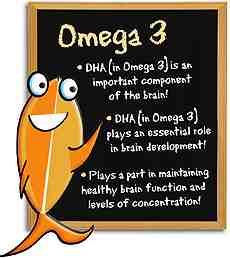 Jean Carper, author of Your Miracle Brain (discussed in another post) offers this list of Ten Fish with the Most Smart Fats:
Jean Carper, author of Your Miracle Brain (discussed in another post) offers this list of Ten Fish with the Most Smart Fats:
- Anchovy
- Bluefish
- Herring
- Mackerel
- Sablefish
- Salmon
- Sardines
- Lake Trout
- Tuna, bluefin
- Whitefish
There is considerable overlap in the two lists. Interested to hear from reader about their favorite brain fish or about which fish to avoid and why.
Sources:
Image of Fresh Fish Market and image of Omega-3 Poster
Categories: Cognitive Decline, Diet, Manage Emotions, Memory and Learning Tags:
Double Dip: Take A Ride on the Brain Bike
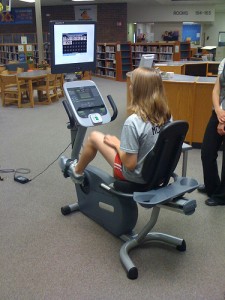 Physical exercise, especially cardio, is good technique for improving brain function. There is no doubt about that. So is specially designed cognitive training software that gives your brain a workout by solving problems, meeting perceptual challenges and even playing games. Imagine combining the two – exercising while working with cognitive training software – to get a double dose of brain training in a single session. That is exactly what the NeuroActive Bike does.
Physical exercise, especially cardio, is good technique for improving brain function. There is no doubt about that. So is specially designed cognitive training software that gives your brain a workout by solving problems, meeting perceptual challenges and even playing games. Imagine combining the two – exercising while working with cognitive training software – to get a double dose of brain training in a single session. That is exactly what the NeuroActive Bike does.
Combing their NeuroActive cognitive training software with an exercise bike the Brain Center of America is the first to introduce a brain bike.
They are available in some health clubs in France, the US and Canada. Here is a list. A few schools in the US are introducing them. For example, I found this story and photo (to the right) about Madison School in Naperville, Illinois.
I have not seen any studies on the effectiveness of this type of double dipping but will keep an eye out. In the meantime I am interested to hear from readers that have taken a ride on the Brain Bike.
Categories: Cognitive Decline, Lifestyle, Memory and Learning, Mental Focus, Perception, Software, Training Tags: brain training, cognitive fitness, exercise
Coffee: The Preferred Drink of High Performing Long-Lasting Brains
 In the Next Brain Blog we explore specific ideas and tools for improving cognitive performance and brain function. Low lying fruit or approaches that are simple, scientifically proven and easy to enact are of special interest.
In the Next Brain Blog we explore specific ideas and tools for improving cognitive performance and brain function. Low lying fruit or approaches that are simple, scientifically proven and easy to enact are of special interest.
Consider for example the simple act of drinking coffee or a relate caffeinated beverage. The scientific evidence for the brain-enhancing effects of coffee are really stacking up. A recent post on Psychology Today’s New Brain Blog, The Fountain of Youth in A Cup of Coffee – Ladies Only, reports:
“Coffee lovers appreciate the mood kick and mental boost a delicious cup of java provides. The enhanced learning, memory, and speed of information processing caffeine delivers has been well documented scientifically. New research published on-line in the current issue of the Journal of Alzheimer’s Disease, reports that coffee can also ward off some effects of aging on the brain. Previous research has shown that caffeine lessens the damage of Alzheimer’s disease caused by the toxic peptide that forms the senile plaques in brains of Alzheimer’s patients. This new study examined 641 elderly persons (over the age of 65) living in three cities in France, Bordeaux, Dijon, and Montpellier. Researchers found a relation between coffee consumption and prevention of cognitive deterioration including the loss of brain tissue in the elderly.”
The post goes on to discuss a recent brain scanning study that shows women (but not men) that drink 3-cups (but not less) of coffee per day lose less white matter after age 50. Thus the subtitle on the post – for women only. But the other studies and effects appear gender neutral.
Boosting energy, mood, memory, learning, processing speed as well as blocking aspects of cognitive decline… all from drinking coffee!
Coffee can have other effects as well. Any changes in diet, physical activity or lifestyle should be considered carefully.
Source: Image of Coffee Man
Categories: Cognitive Decline, Diet, Manage Emotions, Memory and Learning, Mental Focus Tags: mental energy
Doing Simple Math Fast is a Major Brain Stimulant
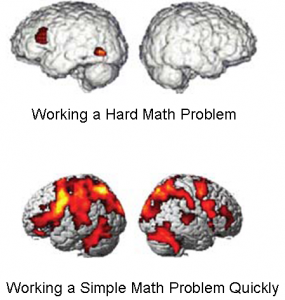 Doing simple calculations (3 + 5 = ?) very fast is becoming a popular brain training technique. It was pioneered by Dr. Ryuta Kawashima a Neuroscientist from Japan. He is well-known for the book Train Your Brain: A Better Brain in 60 Days, and BrainAge the Nintendo-based brain fitness system that we have covered on the Next Brain Blog before.
Doing simple calculations (3 + 5 = ?) very fast is becoming a popular brain training technique. It was pioneered by Dr. Ryuta Kawashima a Neuroscientist from Japan. He is well-known for the book Train Your Brain: A Better Brain in 60 Days, and BrainAge the Nintendo-based brain fitness system that we have covered on the Next Brain Blog before.
Similar techniques are popping up in many other brain training games and programs, especially those designed for mobile phones. For example, check out the Brain Blast Trainer series of iPhone apps.
The question is, does a daily dose of rapid mental mathematics improve your cognition, and if so in what way?
I have not been able to find literature that deals with this question. Dr. Kawahima’s research however, seems to clearly indicate (see figure) that doing simple math calculations rapidly stimulates the brain far more than doing hard math problems. Working the brain hard, like working a muscle hard should make it “bigger and stronger”.
I would like to hear from readers that use simple math as part of their brain fitness workout.
Source: Brain scanning images adapted from BrainAge Instruction Booklet
Categories: Books, Cognitive Decline, Problem Solving, Software, Training Tags: cognitive fitness, games
Vitamin D May Speed Brain Information Processing
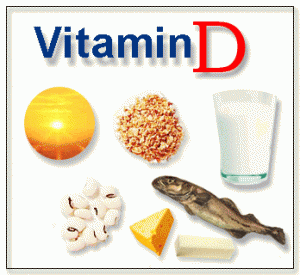 We get vitamin D mainly from the sun’s UV rays, fatty fish, fortified milk or cereals and supplements like a multi-vitamin. D has been in the news lately because there are widespread deficiencies and growing evidence that it supports brain development in children and improved processing speeds in older adults. But the situation is far from conclusive. As recently reported by the Dana Foundation in Vitamin D and the Brain: More Good News,
We get vitamin D mainly from the sun’s UV rays, fatty fish, fortified milk or cereals and supplements like a multi-vitamin. D has been in the news lately because there are widespread deficiencies and growing evidence that it supports brain development in children and improved processing speeds in older adults. But the situation is far from conclusive. As recently reported by the Dana Foundation in Vitamin D and the Brain: More Good News,
Vitamin D has many roles in regulating brain health, from aiding the development of the brain and nervous system to postponing decline toward the end of life, according to a growing body of research. R. Douglas Shytle and Paula C. Bickford review the field and argue that while it is clear that many people worldwide experience vitamin D deficiency, we need to complete much more research to fully understand the consequences of this deficiency for brain health.
And the research is underway. Watch for additional posts on the importance of D for improving cognitive performance on the Next Brain Blog.
Source: Vitamin D Image
Categories: Child, Cognitive Decline, Mental Focus, Older Adult Tags: vitamins

